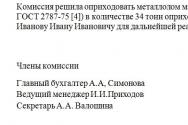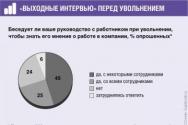IP as well as legal entities. IP is a legal or natural person
And to profit from its activities or engage in individual without forming a legal entity.
In accordance with Article 23 of the Civil Code of the Russian Federation, a citizen has the right to engage in entrepreneurial activities without forming a legal entity from the moment of state registration as an individual entrepreneur. Any citizen has the right to conduct business, but not every citizen is able to exercise this right.
To acquire the status of an individual entrepreneur, a citizen must have the following general features of a subject of civil law:- legal capacity(the ability to have civil rights and bear obligations)
- legal capacity(the ability to acquire and exercise civil rights by one's actions)
- have a place of residence(the place where the citizen resides permanently or predominantly).
Only capable citizens can carry out entrepreneurial activities, that is, those who are able to independently perform legal actions, conclude and execute them, acquire property and own, use and dispose of it. As a general rule, civil capacity arises in full from the onset of adulthood (upon reaching 18 years of age).
The status of an individual entrepreneur is acquired as a result of state registration citizen as an individual entrepreneur.
An unreasonable denial of state registration may be appealed by a citizen in an arbitration court. Denial of state registration of an entrepreneur is allowed only in cases of non-compliance of the composition of the submitted documents and the composition of the information contained in them with the requirements of the Regulations on the procedure for state registration of business entities (No. 1482).
Property disputes between citizens registered as individual entrepreneurs, as well as between these citizens and legal entities, arbitral tribunals, with the exception of disputes not related to the implementation of entrepreneurial activities by citizens.
An entrepreneur bears increased responsibility, unlike other citizens, since, in accordance with the current legislation (Article 401 of the Civil Code of the Russian Federation), a person who has not fulfilled or improperly fulfilled an obligation in the course of entrepreneurial activity is liable regardless of the presence of fault. Claims against an individual entrepreneur can also be presented by creditors for obligations not related to the implementation of entrepreneurial activities (on causing harm to the life, health or property of citizens or legal entities, on the recovery of alimony, etc.).
An entrepreneur (individual) can work in any position on a paid basis in any private, state or public organizations, unless this work or position is prohibited by law from combining with entrepreneurship. Unlike legal entities, the property of individual entrepreneurs, constituting the objects of commercial activity, can be inherited and bequeathed. But the right to engage in entrepreneurial activity is not inherited.
Individuals engaged in entrepreneurial activities without registration bear liability, including criminal liability, in accordance with the legislation of the Russian Federation. All income received from such activities is subject to collection in state revenue.
Commercial activity without formation of a legal entity
Two groups of business entities
In accordance with Russian legislation, two groups of entities can be engaged in commercial activities:- citizens or natural persons;
- legal entities.
The law establishes equal treatment of citizens and legal entities in determining their rights and obligations, in determining any conditions for doing business (commerce, entrepreneurship) that do not contradict the law.
The concept of an individual entrepreneur
Individual entrepreneur is a citizen engaged in entrepreneurial (commercial) activities without forming a legal entity.
A citizen can act on the market as an individual entrepreneur only from the moment of his state registration.
An independent type of individual entrepreneur is the head of a farm operating without forming a legal entity, who is also recognized as an individual entrepreneur from the moment of state registration of his farm.
Basic rights and obligations of an individual entrepreneur
Citizens registered as individual entrepreneurs have rights and obligations, including:- the right to create legal entities independently or jointly with other persons;
- are obliged to answer for their obligations with all their property;
- may be declared bankrupt by a court order.
To, carried out without forming a legal entity, the rules governing the activities of legal entities are applied.
Associations of individual entrepreneurs
Engaging in entrepreneurial activity without forming a legal entity is possible not only by individual entrepreneurs, but by their associations. Such an association is possible only on the basis of a simple partnership agreement. Under a simple partnership agreement, two or more persons combine their contributions and act jointly without forming a legal entity to make a profit or achieve another goal.
For the validity of this contract, the simultaneous presence of three mandatory elements is necessary:- common goal;
- connection of deposits of individual entrepreneurs;
- joint activities to achieve the goal.
When conducting common affairs, each partner has the right to act on behalf of all partners, unless other conditions are provided for by the terms of the contract. At the same time, in relations with third parties, the powers of a partner to make transactions on behalf of all partners are certified by a power of attorney issued to him by the other partners.
The partners are jointly and severally liable for all common obligations, regardless of the grounds for their occurrence. At the same time, even if a person has terminated his participation in the contract, but the contract between the other partners has not been terminated, he is liable to third parties for the general obligations that arose during the period of his participation in the contract.
Types of individual entrepreneurs.
Types of individual entrepreneurs are presented in fig. 1.Bankruptcy (insolvency) of an individual entrepreneur.
An individual entrepreneur may be declared bankrupt if he is unable to satisfy the claims of creditors for monetary obligations or fulfill obligations for mandatory payments within three months from the date of their fulfillment and if the amount of his obligations exceeds the value of his property.
Insolvency (Bankruptcy) of an individual entrepreneur
An individual entrepreneur can be declared bankrupt by decision of the arbitral tribunal in the event that he is unable to satisfy the claims of creditors related to his entrepreneurial activities. Also, the IP can on a voluntary basis officially declare bankruptcy.
The grounds and procedure for recognizing an individual entrepreneur are established by Federal Law No. 127 "On Insolvency (Bankruptcy).
foundation recognition of an individual entrepreneur as bankrupt is his inability to satisfy the claims of creditors for monetary obligations or to fulfill the obligation to make mandatory payments.
Statement on declaring an individual entrepreneur bankrupt can be filed by the debtor, creditor, tax and other authorized bodies on requirements for mandatory payments.
Entrepreneur goes bankrupt and its registration as an individual entrepreneur becomes invalid from the moment the arbitration court makes a decision to recognize the individual entrepreneur as insolvent and to open bankruptcy proceedings. The entrepreneur's licenses issued to him are revoked.
In case of out-of-court an entrepreneur is considered bankrupt after he officially declares his bankruptcy in the Bulletin of the Arbitration Court of the Russian Federation and the official publication of the state bankruptcy agency.
The debtor's announcement of bankruptcy and its liquidation shall indicate the period for filing creditors' claims and creditors' objections against the liquidation of the debtor, which may not be less than two months from the date of publication of the said announcement.
An individual entrepreneur declared bankrupt cannot be registered as an individual entrepreneur within one year from the moment it was declared bankrupt.
The arbitration court sends a copy of the decision to declare the individual entrepreneur bankrupt and to open bankruptcy proceedings to the body that registered the citizen as an individual entrepreneur, and also directs the decision to all known creditors.
Claims of creditors Individual entrepreneurs are satisfied in accordance with the priority established by law at the expense of their property, with the exception of property that cannot be levied in accordance with Federal Law No. 229 "On Enforcement Proceedings".
Claims of creditors of each successive turn shall be satisfied after the claims of creditors of the previous turn have been fully satisfied. If the amount is insufficient to fully satisfy all the claims of creditors of one priority, these claims are satisfied in proportion to the amount of recognized claims of each creditor of this priority.
After completion of settlements with creditors, an individual entrepreneur declared bankrupt considered free from the performance of the remaining obligations related to his business activities, even if they were not declared to the arbitration court. Also considered repaid, regardless of whether they were actually satisfied, claims for other obligations not related to entrepreneurial activity, which were presented and taken into account by the court when declaring an individual entrepreneur bankrupt.
Exception made only for requirements on compensation for harm caused to life and health, and others personal requirements, which remain valid regardless of whether they were presented during the bankruptcy proceedings, in the event that they remained unsatisfied.
Upon completion of the bankruptcy procedure, the bankrupt loses the power of his registration as an individual entrepreneur and all subsequent disputes from that moment are resolved in the courts of general jurisdiction.
It would seem that after that there is no need to find out about the individual entrepreneur - is it a legal entity or an individual. But in fact, an individual entrepreneur has several different statuses:
- an ordinary individual (for example, an individual entrepreneur pays a transport tax as a citizen, and not as a business entity);
- a person who is self-employed;
- an official, similar to the head of an LLC;
- equates to the status of a legal entity, although formally it is not.
The last status of an individual entrepreneur raises another question - how can an individual entrepreneur be a legal entity if we just found out that this is not so?
But this is precisely what follows from the norm 12.31.1 of the Code of Administrative Offenses of the Russian Federation: “For the administrative offenses provided for in this article, persons engaged in entrepreneurial activities without forming a legal entity bear administrative responsibility as legal entities”.
Indeed, in some administrative legal relations, an individual entrepreneur is equated with a legal entity, but in most cases the law is more lenient towards individuals.
The same approach is used by banks when concluding an agreement on. Even departments for work with corporate clients are called departments for servicing legal entities. Although they work with organizations and individual entrepreneurs.
When IP Status Matters
But why such difficulties with determining the status of an individual entrepreneur? Why not just consider him an individual and that's it?
Because an ordinary person, without the status of an individual entrepreneur, does not bear special responsibility for violating the laws that regulate business activities. And a person who has been registered with the IFTS and has become an entrepreneur is responsible for the delivery, payment, payment of salaries, observance of consumer rights, fulfillment of obligations to counterparties, etc.
That is why the responsibility of an individual entrepreneur is higher than that of an ordinary individual. This is stated in Article 2.4 of the Code of Administrative Offenses of the Russian Federation: “Persons engaged in entrepreneurial activities without forming a legal entity are liable as officials unless otherwise provided by this Code."
This is clearly seen if you look at the amount of fines for various administrative offenses. For example, for deceiving consumers (measuring, weighing, or calculating when selling a product (work, service), the following fines are established:
- for citizens - from 3 to 5 thousand rubles;
- for officials - from 10 to 30 thousand rubles;
- for legal entities - from 20 to 50 thousand rubles.
In this case, the entrepreneur is recognized as an official, therefore, a fine of 10 to 30 thousand rubles applies to him. And in the amount of 3 to 5 thousand rubles, they can punish a person who sells the products of his household plot, for the sale of which it is not necessary to register an individual entrepreneur.
But the Code of Administrative Liability may establish, as an exception, special fines - only for individual entrepreneurs. Such a special sanction is, for example, in Article 14.4 of the Code of Administrative Offenses of the Russian Federation - for the sale of goods, the performance of work or the provision of services of inadequate quality to the population:
- for citizens - from 1 to 2 thousand rubles;
- for officials - from 3 to 10 thousand rubles;
- for persons engaged in entrepreneurial activities without forming a legal entity - from 10 to 20 thousand rubles;
- for legal entities - from 20 to 30 thousand rubles.
In this case, an individual entrepreneur is not recognized as either an ordinary individual or an official. Its responsibility is closer to that of a legal entity.
In most cases, administrative sanctions are characterized by a different approach to organizations and individual entrepreneurs. Legal entities are punished with larger amounts, which are ten times higher than fines for entrepreneurs.
For example, if the placement rules are violated, an entrepreneur risks an amount of 3 to 5 thousand rubles. If an advertisement is placed by a legal entity without approval, then it will be charged from 500 thousand to 1 million rubles. In addition to this, the head of the organization is fined.
But if you look at the penalties for disrupting or transferring taxes, then here ordinary individuals, individual entrepreneurs and organizations are called the same - a taxpayer. And they are also fined in the same way, for the same amounts, with some exceptions.
IP employer
Another feature of an individual entrepreneur is his status as an employer. The fact is that ordinary individuals who are not entrepreneurs have the right to hire workers.
The Labor Code of the Russian Federation even contains a special chapter 48, which regulates the characteristics of the work of workers hired by such individuals. Usually these are domestic staff or performers of household (personal) services. An individual who hires an employee for such purposes concludes and registers it with the local administration. But such an employer cannot make an entry.
As for an individual entrepreneur, he, remaining an individual, in labor relations is equated to a legal entity. The procedure for hiring an employee in an individual entrepreneur is similar to applying for a job in an organization, but entrepreneurs received the right to make entries in the work book only in 2006.
After hiring employees, the entrepreneur must:
- ensure safe working conditions;
- pay salaries at least twice a month;
- monthly transfer contributions for pension, medical and social insurance of employees;
- withhold personal income tax from wages and other payments to an employee and transfer it to the budget;
- maintain personnel documents;
- submit reports on employees to the tax office and funds.
Perhaps the only difference between an individual entrepreneur and an organization in labor relations will be the payment of compensation for staff reduction. Only legal entities are required to pay it.
conclusions
- An individual entrepreneur is an individual, not a legal entity. It is wrong to call an individual entrepreneur an organization or an enterprise.
- In many administrative sanctions, an individual entrepreneur is considered not an ordinary individual, but an official. This is an analogue of the head for a legal entity, although an individual entrepreneur cannot be a director.
- In some cases, the law equates an individual entrepreneur to a legal entity. However, this does not mean that an individual entrepreneur receives the same rights as an organization, but only that in a certain situation he bears increased responsibility for his actions.
- Depending on the type of legal relationship and the specific sanction, the status of an entrepreneur will differ - an individual, an official or a person equated to a legal entity.
- In labor relations, an individual entrepreneur is an employer whose duties are similar to those of an employer-organization.
How to understand the status of a person registered as an individual entrepreneur? Is the IP an individual or a legal entity? Is it possible to imply that if a person is registered as an individual entrepreneur, then he is endowed with the rights and obligations of the organization? Let's figure it out.
Basic concepts
A legal entity is an organization that has its own property, civil rights and can represent its interests in litigation. In other words, a legal entity is an enterprise without a permanent link to a citizen (the founders can change based on current legislation and internal rules of the organization).
An individual entrepreneur is a citizen engaged in entrepreneurial activities, in connection with which he has the corresponding rights and obligations. Answering the question, is an individual entrepreneur an individual or a legal entity, it becomes clear that it is definitely an individual, but with enhanced opportunities in the field of entrepreneurial activity, unlike a simple citizen.
Comparison of individual entrepreneur and legal entity
The main difference between an individual entrepreneur and a legal entity is the possibility of carrying out entrepreneurial activities only by a specific citizen. Simply put, no one, except for the entrepreneur himself, for whom the IP registration is registered, can do his own business.
Legal entity means an organization with own capital with one or more founders. The interests of the company in different situations can be represented by different people. That is why, answering the question, an individual entrepreneur is an individual or a legal entity, the answer is always on the surface - an individual entrepreneur refers to an individual.
Despite the fact that the activity of the IP is regulated by paragraph 3 of Art. 23 of the Civil Code of the Russian Federation, which also controls legal entities, in accordance with paragraph 1 of Art. 23 of the Civil Code of the Russian Federation, only a citizen can become an entrepreneur, i.e. individual. The fact of founding a legal entity is not an obstacle.
Individual entrepreneurship attracts more and more citizens, and often those who plan to become an entrepreneur have a legal question: is an individual entrepreneur an individual or an organization? The conditions of the free market create a situation where people open their own small business, becoming self-employed and receiving a certain income from their activities (sale of goods, provision of services). To answer the question, you need to understand the features of the work of IP and Russian legislation.
From the point of view of the laws of the Russian Federation, an individual entrepreneur is:
- individual;
- performs operations in the field of economics by the right obtained after registration of an individual entrepreneur in the tax office.
That is, IP is the entrepreneurial activity of individuals.
However, those wishing to start a business face difficulties in determining the legal status as an individual entrepreneur. Such vagueness of interpretation is due to the imperfection of the legislation, which does not clearly state whether an individual entrepreneur is an individual or a legal entity. The difficulty is also in the fact that, although an individual entrepreneur is characterized as an individual, he also has a number of characteristics inherent in a legal entity. Thanks to this, the entrepreneur, along with civil rights, falls under certain paragraphs of state regulations.
There is a misconception in society that an individual entrepreneur is only a legal entity. Such an opinion is caused by the conviction that an individual entrepreneur is endowed with the rights and obligations inherent in legal entities. But the Civil Code of the Russian Federation does not allow agreeing to this, establishing for individual entrepreneurs the rights of both a citizen and a legal entity.
This confusion of rights is an inherent property of IP. Thus, a registered individual entrepreneur who has officially received this status has the right to purchase services / goods both for his own needs and for the tasks of his business and for the implementation of any business operations. Today there are no tools to adequately assess the legitimacy of these actions. There are only a small number of situations where the law describes all the duties and rights of an individual entrepreneur.
To understand whether an entrepreneur represents a subspecies of legal entities or not, it is necessary to find out in more detail what a legal entity is as such.
So, a legal entity is an organization that owns property, ranging in size from small to large. Such a company becomes both a defendant and a plaintiff before the court, and is able to delegate some rights to itself. The term can be disclosed as "an officially registered association of a group of persons related by common goals and interests."
Signs by which the company is classified as a legal entity. persons:
- Detached property.
- Responsibility for property rights.
- Having your registered name.
Separateness refers to the ownership by a legal entity of certain property. In this case, it belongs to the company, and not to the persons in its composition. Also, any company is required by law to have a company seal and a bank account.
Other salient features:
- some restrictions regarding the transfer of cash to other companies;
- increased level of administrative responsibility;
- certificate of state registration.
Thus, an individual entrepreneur has the features of both a legal entity and an individual, being both a citizen and an enterprise.
To determine the common features, it is important to understand what duties and features a citizen has. An individual has the right to participate in any processes where he is equal in rights with other participants in such.
- transport sector;
- production;
- operations on the stock exchange;
- trade.
 Individuals can carry out business operations on a personal basis, make transactions and conclude contracts. People are also allowed relationships with organizations.
Individuals can carry out business operations on a personal basis, make transactions and conclude contracts. People are also allowed relationships with organizations.
Although an entrepreneur is required to register, the specifics of the work differ from organization to organization.
Signs of difference:
- document management is carried out according to a simplified scheme;
- An individual entrepreneur is responsible for the offense committed, but to a lesser extent, compared with a legal entity. face;
- within the framework of the obligations assumed, the individual entrepreneur is liable with the property belonging to him - similarly to an ordinary citizen.
All these factors introduce some confusion into the question of who an individual entrepreneur is in Russia, whether it is a mistake to attribute it to individuals or legal entities. Today the situation is such that no answer can be considered correct.
An individual entrepreneur is a special subject of the economic life of the state, having the characteristics of both a company and an individual, and enjoying a number of powers of a legal entity. However, it differs from both of these groups. There are no exact grounds to assert that a person who has become an entrepreneur is an organization, since the legislation leaves room for maneuvers and casuistry. It is desirable to focus on the similarities between individual entrepreneurship and the work of a legal entity.
 Under certain conditions, an individual entrepreneur has the right to decide whether he will appear as an entrepreneur or as an ordinary citizen, entering into civil or economic relations. This affects the amount of payments to the entrepreneur, the amount of taxation, etc.
Under certain conditions, an individual entrepreneur has the right to decide whether he will appear as an entrepreneur or as an ordinary citizen, entering into civil or economic relations. This affects the amount of payments to the entrepreneur, the amount of taxation, etc.
So, we found out whether the IP is a commercial organization.
But there are a number of situations when an entrepreneur acts as a legal entity:
- Attracting employees is similar to an enterprise.
- Opening a bank account for doing business.
- Creating and using a seal to certify contracts and other documents. At the same time, unlike an organization, it is not necessary to have an IP seal.
- Performing business activities on a par with legal entities - but not all.
There are some areas where only an individual entrepreneur can work, but a legal entity cannot, and vice versa. A good example of this situation is private security.
Becoming an individual entrepreneur has a number of advantages over those who have chosen the form of registration of a legal entity:
- ease of design. It is very easy to create or liquidate an individual entrepreneur; most of all, it takes waiting for a record of making changes to the USRIP. In comparison with individual entrepreneurs, a commercial organization is forced to follow a difficult path;
- it also takes quite a bit of time to stop the work of the IP;
- the entrepreneur is not limited in the use of his income: money can either be put into circulation for the needs of the business, or spent at your own discretion;
- tax is not paid if personal property belonging to the entrepreneur is used for commerce;
- accounting and reporting are carried out according to a simplified system;
- An individual entrepreneur is free to make decisions on business activities. To reconcile them, figuratively speaking, with oneself is much easier than by convening a meeting of shareholders / directors of the enterprise. There are no internal disagreements, often found in legal entities;
- taxation is also simplified - net profit is not taxed, simplifying the life and activities of an entrepreneur within the law.
But not everything is so wonderful, there are some disadvantages of this form of management:

Thus, answering the question, an entrepreneur is an organization or an individual entrepreneur, it is impossible to give a definite answer. This is a separate subject of economic activity, which has some of the characteristics of both groups with disadvantages and advantages.
An individual entrepreneur has duties, rights and powers both as an organization and as an ordinary citizen, which entails the above disadvantages and advantages.
IP responsibilities include:

The employer is also responsible for:
- for unpaid taxes;
- for illegal use of trademarks;
- for the supply of products and quality of services to contractors;
- in other cases provided for by law.
The responsibility of an individual entrepreneur arises when an entrepreneur has violated the law or debt obligations: in case of debt, he is obliged to pay the debt with his own funds or sell (transfer) property to the creditor.
Entrepreneurial activity of individuals is regulated by law.
Despite the prevalence of individual entrepreneurship, Russian laws contain little regulatory information. However, it is advisable to study this information and understand the meaning of the main provisions of the laws.

Full texts can be found in the online services - the Consultant or the Garant system, as well as on the websites of relevant departments.
The Constitution of the Russian Federation: Article 34, paragraph 1 approves the right of citizens to entrepreneurial and other commercial activities.
Part 1 of the Civil Code:
- article 2, which regulates the relationship between participants in business activities and determines which transactions fall under the category of entrepreneurship;
- article 18. It specifies how citizens can own and dispose of property, and how they can carry out entrepreneurship, create legal entities, and make transactions.
Part 2 of the Civil Code:
- paragraph 4 469 of the article: the responsibility of the individual entrepreneur for the transfer to the buyer of goods of good quality;
- paragraph 3 481 of the article: determines that the transfer of goods must be carried out in proper packaging, if such a requirement is provided for by law.
Tax code: special attention should be paid to the entire Tax Code. It made a lot of changes in the rules of taxation.
There are also a number of federal laws, orders and government decrees, one way or another regulating the activities of individual entrepreneurs. Law 54-FZ deserves attention, according to which a mandatory transition to online cash registers begins.
In addition to it, the following are important:

These documents regulate the activities of entrepreneurs in general, but among them there are more narrowly focused legislative acts relating to individual forms of ownership, including individual entrepreneurs.
Entrepreneurial activity is characterized by the absence of certain limits in making payments in cash. Unlike an individual entrepreneur from a legal entity, his obligations do not include opening a current account and making a seal, while this is considered a prerequisite for the existence of a legal entity. Another difference, which at the same time is an advantage, can be considered the absence of a requirement to have constituent documents. An individual entrepreneur is invariably the only person who owns all the rights and income received. Thus, the solution to the dilemma "Is the IP a legal entity or not?" quite obviously: NO. However, when carrying out entrepreneurial activities, in no case should one ignore the fact that an individual entrepreneur has the powers of a legal entity. Video: who is the IP (29 votes, average: 4.20 out of 5) Loading…
Online journal for an accountant
IP as a physical person (of the same car, apartment, land) even if this property was not used in business activities.
- An individual entrepreneur is obliged to pay taxes in a timely manner in accordance with the chosen form of taxation, and also to make mandatory contributions to the FIU.
- If there are employees, the individual entrepreneur is obliged to act as their tax and insurance agent and pay for them to the relevant budget funds.
- In cases of litigation against persons having the legal status of an individual entrepreneur, the first thing to do is to determine who the citizen acted at the time of the offense - as an individual entrepreneur or as an individual.
IP - an individual or a legal entity? is the IP a legal entity?
Entrepreneurs are subject to certain restrictions. Back to Table of Contents ○ What does the IRS say? From the point of view of tax legislation, individual entrepreneurs are individuals with a special status.
Nevertheless, the Federal Tax Service provides for individual entrepreneurs preferential taxation systems with minimal reporting. Individual entrepreneurs on a special account. Separate rules and regulations are developed for them.
Info
Back to Table of Contents ○ Legal advice: ✔ Can an individual entrepreneur be transformed into a legal entity? There is no direct prohibition on transformation in the legislation, that is, this is allowed. To do this, you must contact the territorial office of the Federal Tax Service and submit the relevant documents.
✔ Can an individual do business without opening a sole proprietorship or LLC? It is legally prohibited to conduct commercial activities without registration.
Is an individual entrepreneur a legal entity or an individual?
Permanent documentary control of cash flow, mandatory opening of a bank account Disposes of profits at its own discretion The head does not have the right to withdraw the proceeds received Can not engage in any type of activity No restrictions on activities Pays contributions to the Pension Fund, even if there is no profit There is an opportunity not to pay contributions to PFR in the absence of income Cannot sell a business No prohibitions on selling a business Lower penalties High penalties in case of violations of the RF Tax Code Cannot attract investors Possibility to attract investors Thus, each of the legal forms has its pros and cons, and any existing an individual entrepreneur can register an LLC by contacting the Federal Tax Service with documents, but taxes and contributions will have to be paid for all forms of activity.
Is it an individual or a legal entity?
- An individual entrepreneur is a specific person, a legal entity is an organization.
- Registration of a person as an individual entrepreneur is carried out at the place of permanent residence, and a legal entity is registered at the legal address.
- An individual entrepreneur operates independently, a legal entity is a team of people (however, both of them can be employers).
- The property of the organization and its founders is separated from each other, the individual entrepreneur, in turn, is liable with all his property, as an individual.
- IP does not have its own name.
- A legal entity is required to have a seal and a bank account, for individual entrepreneurs, both are advisory in nature.
- The activity of a legal entity is impossible without the availability of statutory documents.
Organizations have the right to conduct commercial activities in any area that does not contradict the law.
Legal status of the entrepreneur: is the SP an individual or a legal entity?
Attention
In fact, an individual and an individual entrepreneur have many common features. However, conducting certain types of entrepreneurial activity without registration is not allowed.
We will tell you what are the similarities and differences between an individual entrepreneur and an individual. ✔ Common signs. Common features include the following:
- Legally, individual entrepreneurs and individuals are equal.
- This is a specific person with a full name and identification number.
- The place of permanent registration is the same.
- An individual entrepreneur can act as a citizen when concluding transactions.
- Individuals and individual entrepreneurs have the right to conduct business transactions, conclude transactions, draw up the necessary documents and perform legally significant actions.
- In the event of a debt, individuals and individual entrepreneurs are liable with the property they own.
From the point of view of legislation, an individual entrepreneur is the status of an individual.
Legal status of an individual entrepreneur
Today, registering an individual entrepreneur implies the obligation to keep cash books with a clear indication of the receipt and expenditure of funds, similar to legal entities. They are required to file tax returns.
If a citizen registered as an individual entrepreneur receives income as an individual (for example, from renting or selling housing), he will have to submit two declarations - one as an individual, the other as an individual entrepreneur, indicating income from entrepreneurial activity. The tax inspectorate checks individual entrepreneurs in the same way as legal entities. The same applies to other regulatory bodies. An individual entrepreneur reports to the labor and fire inspectorates, the Committee for the Protection of Consumer Rights and numerous other authorities. About hired labor An individual entrepreneur has the right to attract hired workers, to make entries in work books.
IP - is it an individual or a legal entity?
Consideration of disputes in court In accordance with the Arbitration Procedure Code of the Russian Federation, the Arbitration Court has the right to accept applications from organizations and individual entrepreneurs in the event of the following disputes:
- Economic: for example, about debts.
- Administrative: when conducting a business that is not legally registered.
- Organizational: bankruptcy of LLC.
- Tax: failure to pay advance payments on time.
- Corporate: when causing losses caused by co-founders, founders and participants to a legal entity.
- International economic: in case of default by a company registered on the territory of the Russian Federation in relation to a foreign citizen, or vice versa.
When issuing a decision on the imposition of penalties, the court has the right to be guided by data on the personal property of an individual entrepreneur.
Is this a legal entity or an individual? How does the law and the tax authorities answer this question?
However, it is absolutely wrong to believe that entrepreneurs have the status of a legal entity, because the Civil Code of the Russian Federation provides information that an individual entrepreneur is an individual who has the right to conduct entrepreneurial activities. Moreover, the equivalent of the concept of IP is the term "entrepreneur without a legal entity", which was used in all legislative acts at the beginning of the current century.
Each person can start doing business and get the status of an individual entrepreneur, and for this he does not need to own an office, and the place of registration of an entrepreneur can be his place of residence. Even if you are not registered in the prescribed manner and within the established time frame as an individual entrepreneur, but you are engaged in entrepreneurial activity, then in this case you are also considered an individual entrepreneur, as indicated in paragraph 1 of this Code.
2 tbsp. 11 h. 1 of the Tax Code of the Russian Federation.
IP - an individual or a legal entity?
As you know, in a commercial organization, income is paid only once a quarter in the form of dividends. In this important issue, an individual entrepreneur, without any doubt, enjoys much more freedom compared to a legal entity.
From a legal point of view, registration of an individual entrepreneur does not oblige him to keep accounting records and without fail to open a bank account for doing business. Such an entrepreneur can settle in cash (of course, observing all legal norms).
Although in practice today this practically does not occur. On fines and seals Another important difference relates to the amount of fines that inevitably occur due to errors in the maintenance and official execution of business documents.
Penalties for such violations, voluntary or involuntary, are very substantial.
The Civil Code states in black and white: “An individual entrepreneur (IP) carries out his activities without forming a legal entity (legal entity).” But why, in this case, the question is increasingly heard: “Is an individual entrepreneur an individual or a legal entity?”. Is it really all about our flagrant legal illiteracy? About problems and confusion It turns out that everything is not so simple. The reason for the emergence of such doubts is that the same Civil Code, after determining the individual entrepreneur, almost immediately reports that the same provisions and rules that regulate the activities of legal entities apply to its activities. Often, the tax authorities impose requirements on entrepreneurs that are similar to the requirements for commercial organizations.
However, there is still a difference between these concepts. ✔ Distinguishing features. The difference between an individual entrepreneur and an individual lies in the system of income taxation and the permissible field of activity.
For example, an individual with the status of an individual entrepreneur cannot be an employee and at the same time conduct entrepreneurial activities. A person, being an individual entrepreneur, can be an employee, but as an individual.
Many types of commercial activities are not available to an individual who does not have the status of an individual entrepreneur. So, for example, he cannot open a pavilion and sell any goods there or engage in the provision of household services to the population. Back to Table of Contents ○ Comparison of sole proprietorship and legal entity. Quite often you can find the identification of the status of an individual entrepreneur and a legal entity. This is not entirely correct from the point of view of legislation, but nevertheless, there are certainly similarities between these statuses.







